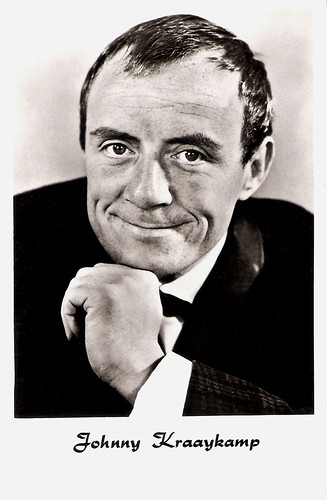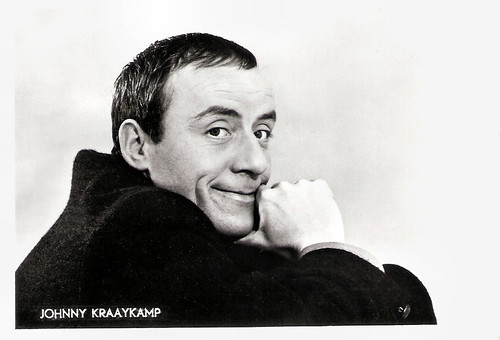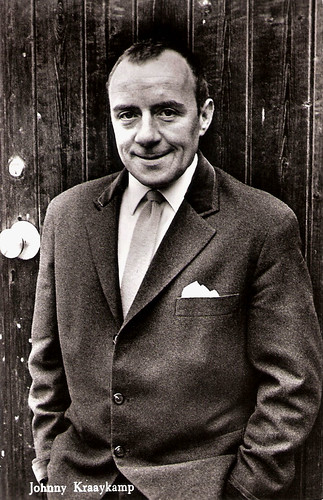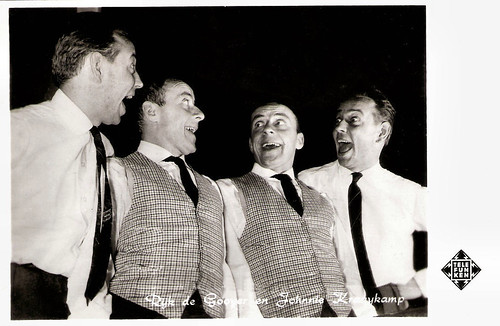Today is the final day of the Netherlands Film Festival (NFF), and also of EFSP's Unofficial Netherlands Film Postcard Festival (UNFPF). Today's star is John Kraaykamp, Sr. (1925–2011), one of The Netherlands' most popular comedians, praised for his perfect timing. For years, he formed a comedy team with Rijk de Gooyer as Johnny & Rijk. He also played in more serious plays and films, including the Academy Award-winning WW II film drama De aanslag/The Assault (1986).

Dutch card.

Dutch card by Anova, Amsterdam.
Johnny Kraaykamp (also written as Kraaijkamp) was born Jan Hendrik Kraaijkamp in Amsterdam, The Netherlands in 1925. He was one of four children of a greengrocer and a house cleaner. He grew up in the Kinkerbuurt in Amsterdam. After an accident, his father was declared unfit for work and Johnny had to find work at a young age.
At 14, he already performed as a boy soprano in the famous Amsterdam theatre Carré. He worked for a short while as an acrobat but then moved on to become a singer in a show orchestra. He performed as an entertainer and bass player in local bars, where he was discovered in the 1950s by Rijk de Gooyer.
Together they recorded the song 'Twee jongens op een gitaar' (Two Guys on a Guitar). It was the start of a long and successful partnership. Johnny and Rijk began to perform together on radio and television. In the Spring of 1956, they joined the Weekendshow, a popular entertainment show on Dutch radio. They also toured with the Snip & Snap Revue and performed in several comedy plays written for TV, together and apart.
In 1962, they got together again for Open het dorp (Open the village), an extremely well-watched TV benefit marathon presented by Mies Bouwman, in which they performed in their pyjamas. In the 1960s and 1970s, they performed regularly together on Dutch TV. In 1964, they began with the Johnny & Rijk shows. In their shows, Rijk was the ‘feeder’ and John the comedian. The duo also recorded a couple of hit singles, including 'De Bostella' (The Bostella), for which they received a golden record in 1968. They even had a show on German TV, Spass durch Zwei/Fun By Two (Bob Rooijens, 1970-1971).
Johnny also appeared in several Dutch films, including Daniël (Erik Terpstra, 1971), Geen paniek/No Panic (Ko Koedijk, 1973) with Rijk de Gooyer, De vijf van de vierdaagse/The Five Are Marching In (René van Nie, 1974), Heb medelij Jet/Happy Days Are Here Again (Frans Weisz, 1975), and the anthology films Zwaarmoedige verhalen voor bij de centrale verwarming/Melancholy Tales (Nouchka van Brakel a.o., 1975) and Vroeger kon je lachen/One Could Laugh in Former Days (Bert Haanstra, 1983), the latter with adaptations of ironic newspaper-columns by the Dutch author Simon Carmiggelt. In Germany, Kraaykamp appeared in the sex comedy Die Stoßburg/The Sex Castle (Franz Marischka, 1974) and in Belgium in the drama Verbrande brug/Burned Bridges (Guido Henderickx, 1975) with Yves Beneyton.

Dutch card.

Dutch card by Anova, Amsterdam.
Boy soprano
Johnny Kraaykamp (also written as Kraaijkamp) was born Jan Hendrik Kraaijkamp in Amsterdam, The Netherlands in 1925. He was one of four children of a greengrocer and a house cleaner. He grew up in the Kinkerbuurt in Amsterdam. After an accident, his father was declared unfit for work and Johnny had to find work at a young age.
At 14, he already performed as a boy soprano in the famous Amsterdam theatre Carré. He worked for a short while as an acrobat but then moved on to become a singer in a show orchestra. He performed as an entertainer and bass player in local bars, where he was discovered in the 1950s by Rijk de Gooyer.
Together they recorded the song 'Twee jongens op een gitaar' (Two Guys on a Guitar). It was the start of a long and successful partnership. Johnny and Rijk began to perform together on radio and television. In the Spring of 1956, they joined the Weekendshow, a popular entertainment show on Dutch radio. They also toured with the Snip & Snap Revue and performed in several comedy plays written for TV, together and apart.
In 1962, they got together again for Open het dorp (Open the village), an extremely well-watched TV benefit marathon presented by Mies Bouwman, in which they performed in their pyjamas. In the 1960s and 1970s, they performed regularly together on Dutch TV. In 1964, they began with the Johnny & Rijk shows. In their shows, Rijk was the ‘feeder’ and John the comedian. The duo also recorded a couple of hit singles, including 'De Bostella' (The Bostella), for which they received a golden record in 1968. They even had a show on German TV, Spass durch Zwei/Fun By Two (Bob Rooijens, 1970-1971).
Johnny also appeared in several Dutch films, including Daniël (Erik Terpstra, 1971), Geen paniek/No Panic (Ko Koedijk, 1973) with Rijk de Gooyer, De vijf van de vierdaagse/The Five Are Marching In (René van Nie, 1974), Heb medelij Jet/Happy Days Are Here Again (Frans Weisz, 1975), and the anthology films Zwaarmoedige verhalen voor bij de centrale verwarming/Melancholy Tales (Nouchka van Brakel a.o., 1975) and Vroeger kon je lachen/One Could Laugh in Former Days (Bert Haanstra, 1983), the latter with adaptations of ironic newspaper-columns by the Dutch author Simon Carmiggelt. In Germany, Kraaykamp appeared in the sex comedy Die Stoßburg/The Sex Castle (Franz Marischka, 1974) and in Belgium in the drama Verbrande brug/Burned Bridges (Guido Henderickx, 1975) with Yves Beneyton.

Dutch postcard by Gebr. Spanjersberg N.V., Rotterdam, no. 1109. Photo: Artone.

Johnny Kraaykamp and Rijk de Gooijer. Dutch postcard by Editions Altona, Amsterdam / Gebr. Spanjersberg, Rotterdam. Photo: Telefunken.
Pig-headed old man
In 1973, John Kraaykamp made a couple of TV shows without Rijk de Gooyer, but with Tonny Huurdeman as his new feeder. De Gooyer had started a successful film career. Unfortunately, these shows were not very successful: the show only lasted three episodes. Later a series of Johnny Kraaykamp Shows was more successful. In 1985, he joined old partner De Gooyer in the TV series De Brekers/The Brekers (Rob Herzet, 1985-1988), which co-starred Adèle Bloemendaal.
Kraaykamp also played in a couple of prestigious films in the 1980s, including De Wisselwachter/The Pointsman (Jos Stelling, 1986) and Iris (Mady Saks, 1987), with Monique van de Ven. His most successful film was De aanslag/The Assault (Fons Rademakers, 1986), in which he played an old resistance fighter opposite Derek de Lint. Kraaykamp also was a prolific stage actor. With theatre company Ensemble he played in The Taming of the Shrew from 1958 to 1959. From 1962 to 1964 he was a member of the Amsterdams Volkstoneel. He also starred in a couple of musicals, including Irma la Douce (1962–1964) and Man of La Mancha (1969–1970).
After a period of comic plays, he joined the Ro Theater in 1979 to play several classic roles. The title role in William Shakespeare's King Lear that year is considered his big breakthrough as a serious actor. He also performed in A Midsummer Night's Dream. In 1984 he won the Louis d'Or, the most prestigious award in stage acting in The Netherlands, for his lead role in Denis Diderot's Jacques de fatalist en zijn meester (Jack, the fatalist and his master).
From 1988 on, he starred on TV in the prison sitcom Laat maar zitten/Leave Them in Jail (John van de Rest, 1988-1991), based on the British TV series Porridge. His most successful role in later years was the part of Piet Boverkerk in the comedy series Het zonnetje in huis/Sunshine at Home (Hans de Korte, 1993-2003). In the show, he played a pig-headed old man who came to live with his son and daughter-in-law (played by his own son, John Kraaijkamp, Jr, and Martine Bijl) after his wife passed away. The show was a remake of the British sitcom Tom, Dick and Harriet, created by Cooke and Mortimer.
Kraaykamp's last film was the successful child drama Kruimeltje/Little Crumb (Maria Peters, 1999) featuring Ruud Feltkamp. John Kraaijkamp died in 2011 in Laren. He was 86. Kraaijkamp was married three times and had four children. With Riemada Elisabeth Panhuysen, he had two children, a son John (1954) and a daughter Ellissigne. With his second wife, Tilly van Duijkeren, he had a son, Michiel. With Mai Lun Lee he had a daughter, Sanne. John, Ellissigne and Sanne became actors. Throughout his life, Kraaykamp received several acting awards. Besides the Louis d'Or in 1984, he received the Golden Calf (the Dutch Oscar) in 1986 for his roles in the films De aanslag/The Assault and De Wisselwachter.
Johnny & Rijk sing De Bostella. Source: TopPop (YouTube).
American trailer for De aanslag/The Assault. Source: The Best Foreign Movies (YouTube).
Sources: Beeld en Geluid (Dutch), Wikipedia (Dutch) and IMDb.
This post was last updated on 11 January 2025.
No comments:
Post a Comment